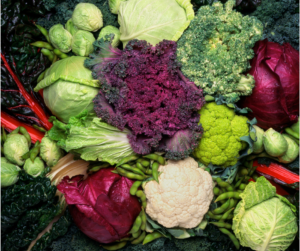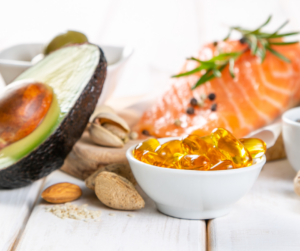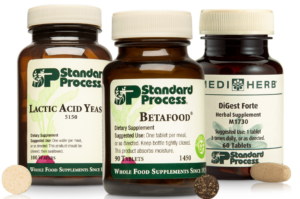By Claire Bacon, ACN, CNC
For so many people, gas and bloating frequently cause feelings of discomfort and embarrassment. Sometimes the reason why is obvious, if you’ve gone off the rails with your last couple meals. Other times, it can be more of a complex issue that requires a deeper understanding.
What’s Causing My Gas and Bloating?
Intestinal gas is usually caused by an inability to break down carbohydrates in the small intestine. When undigested food passes into the small intestine, gut bacteria work on breaking it down. This action produces hydrogen, carbon dioxide, and sometimes methane. Sometimes, the types of gut bacteria living in the small intestine are not appropriate to do this work. Or sometimes, the sheer number of living organisms is excessive and can cause issues.
Feeling bloated after eating is common and can be caused either by excess gas production, or by insufficient digestive actions of the stomach and/or liver/gallbladder. Impaired hydrochloric acid function, lack of digestive enzymes, or bile production can all make you feel sluggish and weighed down after a meal. An understanding of what types of foods or stressful situations cause issues can help you understand and fix the problem for good.
For instance, if you have been relying on fixing a large portion of pasta or rice, and eating off that for lunch every day, that’s an easy way to cause gas. Also, if you tend to eat at your desk while simultaneously answering emails, this can have an effect. Your stressful multitasking may shut down your digestion and make everything more dysfunctional.
Trying to fix your gas and bloating may have been difficult in the past, but it can be solved with the right adjustments to diet and supplementation…

Main Factors Causing Gas:
If you’re frequently experiencing gas and bloating, there are several main culprits to consider…
- Consuming artificial sweeteners or even natural sweeteners like Monk Fruit
- Having carbonated beverages like seltzer water and sodas
- Eating high fiber/carbohydrate foods like dried fruits, broccoli or cabbage, and whole grains
- Food sensitivities such as lactose (milk) or wheat gluten
- Chronic infections or issues such as inflammatory bowel disease or diverticulitis
- Bacterial, yeast, or fungal overgrowth in the gut.
If you’ve been having problems for a long time, you may actually have several factors contributing to your issues.

Tips to Prevent Gas and Bloating:
1. Eat Real Food with Whole Food Fiber
Unfortunately, the typical American diet is highly processed, and full of chemical additives. Foods like this are difficult to digest, for the following reasons:
- they don’t give healthy fiber to feed the gut bacteria,
- don’t offer natural minerals or cofactors,
- and put a strain on the body’s resources for detoxification.
If you spend several days ingesting fast-food or convenient boxed items, you may notice your gut doesn’t feel quite right. Better to stick to fresh foods from the produce department.
2. Understand What a Healthy Fat is for You
Not all digestive systems are made equally. Some people can easily handle a greasy burger, whereas others have to be extremely careful of how much and what types of fats are used in cooking. Especially if you have had a prior gallbladder attack, your bile production system may not be up for the task of digesting much fat.
Most people use olive oil as their main cooking oil. But, did you know that olive oil, when heated, becomes more difficult to digest? It is actually much easier to digest coconut oil, avocado oil, butter, ghee, or grapeseed oil, especially if you’re cooking something at high heat. Depending on the flavor you’re looking for, using a variety of cooking oils can relieve stress on your liver & gallbladder system.
And, it’s never a good idea to use canola oil or vegetable oil blends. These oils are highly inflammatory and contribute to many diseases in the body. If you’re looking to get healthier, we always recommend these oils go straight in the trash.

3. Eat Mindfully and Manage Stress
If you’re distracted, stressed, and multi-tasking, it’s incredibly easy to eat too much too quickly. This can lead to gas, bloating, and indigestion. Eating slowly and mindfully can help focus the body’s resources on producing digestive acids (rather than stress hormones) and reduce digestive issues. We now know that chronic stress changes how your living microbiome behaves. Managing your stress can help keep everything working in harmony.
Did you know that digestion starts in the mouth? The more your teeth chew your food into smaller particles, the easier your gut can digest your food. Try not to wolf your food down without chewing properly. When you’re not listening to your body, it’s easy to miss when your body says you’re full.
4. Take Your Supplements
When digestion isn’t working right, the fast track to feeling better is to take the right supplements. We can use key supplements in several ways. First, we can add whatever substance is missing to the system (enzymes, hydrochloric acid, etc.). Or, we can use herbs to stimulate the body’s own production of digestive acids and bile. And, we can use a variety of products to actually fix what’s wrong – whether it be to promote healing, to clear infection, or soothe irritated tissues.

We have several supplements you can take to specifically help with gas and bloating:
- Lactic Acid Yeast chewable wafers contain a beneficial blend of Saccharomyces yeast to help counteract Candida and other problematic yeasts in the gut. Great for breaking down excess carbohydrates within the small intestine.
- DiGest Forte tablets contain a blend of bitter herbs to stimulate your own digestive acids and bile.
- Betafood contains extracts of fresh, red beets, which help to thin the bile, promote fat assimilation and regular elimination.
Don’t see a product in our online store? Just give our office a call, and we’re happy to ship to you!
In Conclusion:
Practicing these good habits and leaving any bad dietary choices behind can quickly improve your digestion. These tips can help prevent gas, bloating, and any uncomfortable feelings you have during digestion.
We hope these practical tips help you feel better!


